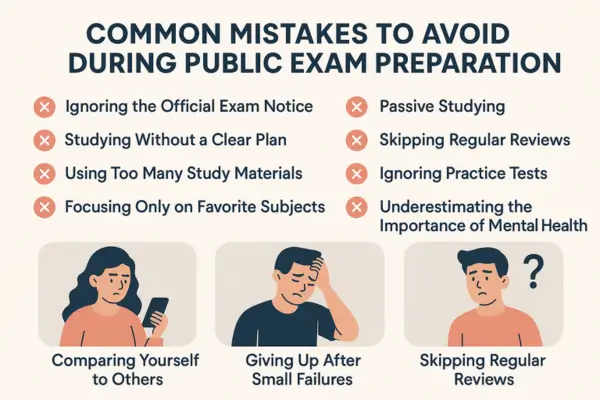Preparing for a public exam is an intense and challenging journey that demands more than just hard work. It requires smart planning, disciplined execution, and awareness of common pitfalls that can undermine your efforts. Many candidates study for months, even years, only to fall short due to avoidable mistakes. In this article, we’ll explore the most frequent errors candidates make — and more importantly, how you can avoid them to maximize your chances of success.
1. Skipping the Exam Notice or Guidelines
The first mistake many candidates make is not reading the official exam notice carefully.
This document provides crucial information, including:
- The list of subjects and topics.
- The format of the exam (multiple-choice, essay, oral tests).
- Eligibility requirements.
- Important deadlines and rules.
Ignoring this information leads to nasty surprises later, like studying irrelevant topics or missing important dates.
Always read the entire notice and highlight the key points before beginning your preparation.
2. Studying Without a Clear Plan
Jumping into studying without a structured plan is another major mistake.
Without a roadmap, you risk:
- Spending too much time on less important subjects.
- Neglecting critical topics.
- Feeling overwhelmed and stressed close to exam day.
Solution:
Create a realistic, time-bound study plan that covers the entire syllabus.
Break it down week-by-week and adjust as necessary, allowing room for revisions and practice tests.
3. Relying on Too Many Study Materials
Some candidates think the more books they buy or the more courses they enroll in, the better prepared they’ll be.
In reality, too many resources create confusion, information overload, and lack of depth.
Tip:
Choose one or two high-quality sources per subject and stick with them. It’s better to deeply understand a few materials than to skim through dozens.
4. Ignoring Core Concepts and Fundamentals
Another frequent mistake is focusing only on memorization without understanding the underlying concepts.
Public exams, especially competitive ones, often test your ability to apply concepts, not just recall facts.
Strategy:
- Understand “why” and “how,” not just “what.”
- Solve practical problems and case studies.
- Teach the concepts aloud to check your comprehension.
Strong fundamentals make it easier to tackle tricky questions confidently.
5. Passive Studying Instead of Active Engagement
Reading textbooks, highlighting notes, and passively listening to lectures give the illusion of learning, but real mastery comes from active engagement.
Effective active study methods include:
- Summarizing topics in your own words.
- Solving past papers and practice questions.
- Teaching the material to someone else.
- Using active recall and spaced repetition techniques.
Engaging actively with the content leads to better retention and understanding.
6. Delaying Practice Tests
Some candidates wait until they “finish the syllabus” to start solving mock tests — a huge mistake.
Regularly taking practice exams is essential because it:
- Improves time management.
- Identifies weak areas early.
- Familiarizes you with the exam pattern.
Best practice: Start taking partial practice tests after completing a few topics and full-length mock exams at least two months before the real test.
7. Ignoring Revision
Another critical mistake is underestimating the need for consistent revision.
Even if you understand a topic today, you may forget it in a few weeks if you don’t review it.
Tip:
- Schedule weekly reviews of past topics.
- Use mind maps, flashcards, and quick quizzes to refresh your memory.
- Apply spaced repetition for maximum retention.
Revision isn’t optional — it’s an essential pillar of preparation.
8. Neglecting Health and Well-Being
Physical and mental health directly affect your ability to learn and retain information.
Common health mistakes include:
- Skipping meals or eating unhealthy food.
- Sacrificing sleep to study more.
- Avoiding exercise or relaxation activities.
Healthy practices to adopt:
- Sleep 7–8 hours per night to optimize brain function.
- Eat balanced meals rich in protein, fruits, and vegetables.
- Exercise regularly — even 20 minutes daily improves concentration and mood.
Taking care of your body boosts study efficiency and emotional resilience.
9. Comparing Yourself to Others
Constantly measuring your progress against others leads to anxiety, self-doubt, and wasted energy.
Everyone’s journey is different:
- Different starting points.
- Different study conditions.
- Different life responsibilities.
Focus on your own progress, not someone else’s timeline.
Track your growth week by week and celebrate small wins.
10. Giving Up Too Early
Many candidates abandon their dreams because of initial failures or slow progress.
They expect quick results and lose motivation when reality doesn’t match expectations.
Remember:
- Success in public exams is a marathon, not a sprint.
- Persistence and consistency are more important than bursts of intense effort.
- Every expert was once a beginner facing the same struggles.
Stay committed to your goal, even when results are slow to show.
11. Overloading Study Sessions
Trying to study for 8–10 hours a day without proper breaks can lead to mental fatigue and reduced retention.
Smarter strategy:
- Use the Pomodoro technique: 25 minutes of focused study + 5 minutes of rest.
- After every 4 cycles, take a longer break (15–30 minutes).
- Study intensively for fewer hours rather than dragging study sessions endlessly.
Quality always trumps quantity.
Final Thoughts: Smart Preparation Prevents Regret
Avoiding common mistakes is just as important as adopting smart study techniques.
By reading exam notices carefully, planning realistically, studying actively, practicing regularly, taking care of your health, and staying mentally resilient, you set yourself apart from the competition.
The difference between success and failure often lies in the small decisions you make every day.
Make those decisions wisely, stay focused, and remember: every step forward, even a small one, brings you closer to your dream. 🌟

